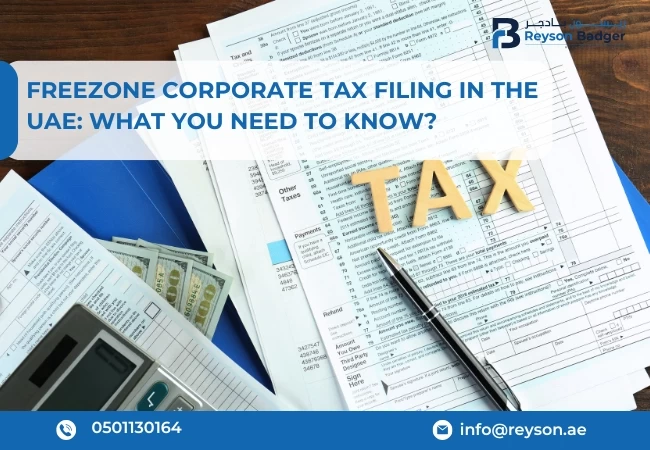Freezone Corporate Tax Filing in the UAE: What You Need to Know?
Written By Akshaya Ashok, Reviewed By Retheesh R S
Published on 06/02/2025

The United Arab Emirates (UAE) has implemented a new corporate tax. This is a significant alteration to the country's tax system. The UAE aims to be a top destination for enterprises. Freezones play a key role in this. They offer special benefits for companies working there. With the new Corporate Tax, businesses in these free zones need to understand how to file their taxes. This helps them stay compliant and keep tax costs low while enjoying the perks of being in a free zone. This guide will help these businesses understand how the UAE's Corporate Tax affects them and their work.
What are the Requirements for Freezone Corporate Tax Filing in the UAE?
The United Arab Emirates (UAE) has introduced a federal Corporate Tax system, which applies to all businesses operating in the UAE, including those in Free Zones. Freezone businesses are required to file Corporate Tax returns with the Federal Tax Authority (FTA) and comply with the applicable regulations.
Filing Requirements
To ensure compliance with the Corporate Tax regulations, Freezone businesses must meet the following filing requirements:
- Key Deadlines: Corporate Tax returns must be filed within nine months from the end of the financial year.
- What to Report: Freezone businesses must report their taxable income, deductions, and exemptions, as well as any adjustments made to their financial statements.
- Documentation: Businesses must maintain accurate and complete records, including financial statements, tax returns, and other relevant documents.
Consequences of Non-Compliance
Failure to comply with the Corporate Tax filing requirements can result in:
- Penalties: Late or incorrect filings may incur penalties, fines, and interest on the amount due.
- Long-term Risks: Repeated non-compliance can lead to reputational damage, loss of business licenses, and even criminal prosecution.
Who needs to Register for Freezone Corporate Tax Filing in the UAE?
Freezone businesses in the UAE must register for Corporate Tax if they meet certain eligibility criteria. Here we guide you on who needs to register, the registration process, and the required documents.
Eligibility Criteria
The following Freezone businesses must register for Corporate Tax:
- Businesses with taxable income: Freezone businesses with taxable income exceeding the mandatory registration threshold must register for Corporate Tax.
- Businesses with a UAE permanent establishment: Freezone businesses with a permanent establishment in the UAE, such as a branch or office, must register for Corporate Tax.
- Businesses engaged in certain activities: Freezone businesses engaged in specific activities, such as financial services or insurance, may be required to register for Corporate Tax.
Registration Process
To register for Corporate Tax, Freezone businesses must follow these steps:
1. Submit an application: Businesses must apply for Corporate Tax registration through the Federal Tax Authority (FTA) portal.
2. Provide required documents: Businesses must provide the required documents, including:
- Trade license: A copy of the business's trade license.
- Articles of association: A copy of the business's articles of association.
- Proof of address: Proof of the business's address in the UAE.
- Financial statements: The business's financial statements for the previous financial year.
3. Obtain a Tax Registration Number (TRN): Once the application is approved, the business will be issued a TRN, which must be used for all Corporate Tax-related transactions.
Importance of Obtaining a TRN
Obtaining a TRN is crucial for Freezone businesses, as it:
1. Confirms registration: A TRN confirms that the business is registered for Corporate Tax.
2. Enables tax compliance: A TRN enables businesses to comply with Corporate Tax regulations and file tax returns.
3. Avoids penalties: Failure to obtain a TRN can result in penalties and fines.
What are the steps for Freezone Corporate Tax Filing in the UAE?
Filing Corporate Tax returns is a crucial compliance requirement for Freezone businesses in the UAE. To ensure accurate and timely filing, follow this step-by-step guide.
Step 1: Gather Required Documents
- Audited financial statements: Obtain audited financial statements for the relevant financial year.
- Tax computations: Prepare tax computations, including taxable income, deductions, and exemptions.
- Supporting documents: Gather supporting documents, such as invoices, receipts, and bank statements.
Step 2: Complete the Corporate Tax Return Form
- Obtain the form: Download the Corporate Tax return form from the Federal Tax Authority (FTA) website or obtain it through the FTA's online portal.
- Fill in the form: Complete the form accurately, ensuring all required information is provided.
- Attach supporting documents: Attach all supporting documents, including audited financial statements and tax computations.
Step 3: Submit the Corporate Tax Return
- Online submission: Submit the Corporate Tax return through the FTA's online portal.
- Manual submission: Alternatively, submit the return manually through a registered tax agent or in person at an FTA office.
Filing Tips
- Ensure accurate and complete disclosure of all taxable income and expenses.
- Double-check tax computations to avoid errors or discrepancies.
- Consult with a registered tax agent or accountant to ensure compliance with Corporate Tax regulations.
- Submit the Corporate Tax return within the prescribed deadline to avoid penalties and fines.
How Can Freezone Businesses Stay Tax Compliant?
Freezone businesses must prioritize accurate record-keeping and adhere to best practices to maintain tax compliance.
What is the Importance of Record-Keeping?
Maintaining accurate and complete financial records is crucial for tax compliance. Freezone businesses must:
- Maintain financial records: Keep accurate and detailed financial records, including income statements, balance sheets, and general ledgers.
- Retain invoices and receipts: Store invoices, receipts, and other supporting documents for all business transactions.
- Required retention period: Retain tax records for at least 5 years from the end of the relevant financial year.
Compliance Best Practices:
To ensure ongoing tax compliance, Freezone businesses should:
- Conduct regular audits: Perform regular audits to ensure the accuracy and completeness of financial records.
- Stay updated with tax regulations: Stay informed about changes to tax laws, regulations, and procedures.
- Consult with tax experts: Seek guidance from registered tax agents or accountants to ensure compliance with tax regulations.
- Implement internal controls: Establish internal controls to prevent errors, fraud, or non-compliance.
What are Common Challenges and Mistakes in Corporate Tax Filing?
Corporate tax filing can present challenges and mistakes that businesses must navigate to ensure compliance and avoid penalties. Here are some common issues faced by corporations:
Challenges in Corporate Tax Filing:
- Understanding the Regulations: The complexity of the UAE’s tax laws, especially with the introduction of the federal corporate tax regime, can be overwhelming. Companies often struggle to keep up with new regulations, including exemptions, rates, and compliance requirements, leading to potential misinterpretations and errors in filings.
- Reporting and Documentation: Maintaining accurate records and thorough documentation is essential yet burdensome for many organizations. Companies with diverse operations may find it particularly challenging to ensure that all relevant transactions are documented correctly, which is critical for compliance.
- Integration of Systems: Many businesses face difficulties in integrating their existing accounting and reporting systems with new tax requirements. This lack of integration can result in errors in reporting and compliance, potentially leading to financial penalties.
- Tax Residency and Permanent Establishment (PE): Determining tax residency and understanding how a permanent establishment is established can be complicated, especially for multinational corporations without a clear physical presence in the UAE.
- Cross-Border Transactions: Companies engaged in international trade may encounter challenges related to transfer pricing laws, double taxation, and compliance with regulations across multiple jurisdictions, complicating their tax filings.
- Human Resource Constraints: Organizations often lack the dedicated expertise or resources necessary to effectively navigate corporate tax compliance. This gap can lead to mismanagement of tax obligations and increased risk of penalties.
- Technology Readiness: Keeping up with technological advancements that facilitate tax compliance can be difficult for some companies. Relying on outdated practices may result in inefficiencies and errors in tax reporting.
- Ongoing Education: The dynamic nature of tax laws necessitates continuous learning and adaptation. Businesses may struggle to maintain up-to-date knowledge among their staff regarding changing regulations.
Mistakes to Avoid in Corporate Tax Filing:
- Incorrect Classification of Income: Misclassifying income can lead to inaccurate tax calculations, resulting in overpayment or underpayment of taxes. Ensuring proper categorization is essential for accurate filings.
- Failure to Keep Accurate Records: Inadequate documentation or poor record-keeping practices can complicate audits and lead to penalties if discrepancies are found during reviews.
- Neglecting Compliance Deadlines: Missing filing deadlines due to poor planning or oversight can result in significant penalties and interest charges, impacting overall financial health.
- Lack of Coordination Across Departments: Failing to coordinate between finance, accounting, and tax departments can lead to inconsistent information being reported, increasing the risk of errors in filings.
- Ignoring Changes in Tax Laws: Not staying informed about updates or changes in tax regulations can result in non-compliance issues that could have been avoided with proactive management.
What Should Freezone Businesses Keep in Mind?
Businesses in UAE-free zones need to keep a few things in mind about corporate tax filings now that the Federal Corporate Tax Law is in place. They get a 0% corporate tax rate on certain income, which is great. However, they need to know where their income comes from and keep good records to follow the rules.
Planning comes first on the list. It’s important to file tax returns on time and accurately to avoid penalties and make the most of tax benefits. Getting advice from professionals can help. Experts like Reyson Badger can offer useful tips and strategies that fit each business. This way, free zone businesses can make sure they get their tax benefits while staying within the law.

Written By
Akshaya Ashok
Akshaya Ashok is a content writer specializing in creating content focused on accounting and auditing. With over two years of experience, she has developed expertise in crafting professional content for the financial sector.

